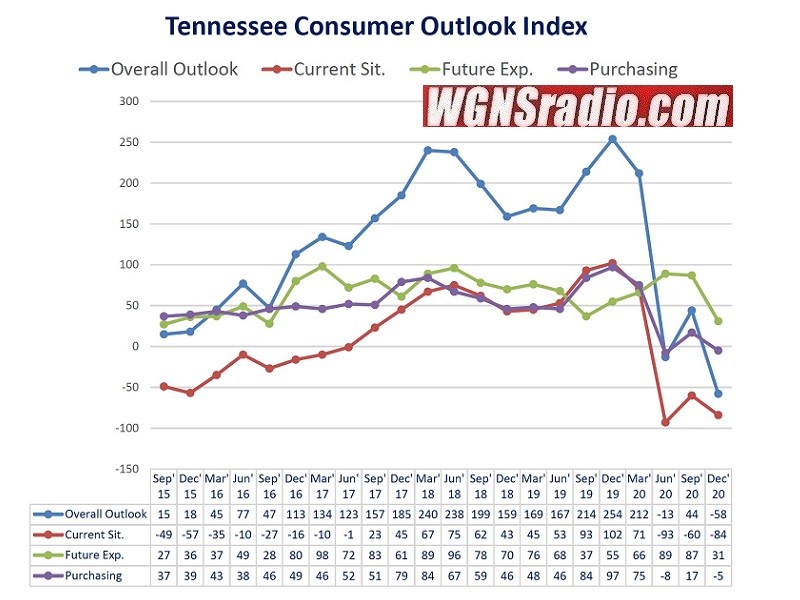(MURFREESBORO) A statewide MTSU study shows that the outlook of the current and future economy has plummeted among Tennessee consumers following the recent presidential election and as COVID-19 cases continue to explode across the state.
On the heels of summer and fall gains as the nation rebounded from the economic impact of COVID-19, the Tennessee Consumer Outlook Index returned to negative territory, dropping to -58 in December from 44 in September, reports the Office of Consumer Research in the Jennings A. Jones College of Business at MTSU.
“Of most significance is the eroding outlook for the future, which had remained steady during the year,” said Tim Graeff, marketing professor and director of the Office of Consumer Research. “Recent improvements in outlook as the economy began to rebound from the pandemic have now been negated. Such negative views and outlook have led to more hesitant views regarding spending.”
For the majority of this past year following the onset of COVID-19 and the accompanying economic shutdowns, Tennessee consumers remained optimistic about the future economy. However, such optimism has now faded, the report noted.
Election impact?
“Even with good economic news of recent gains in the stock market, approval of COVID-19 vaccines, peace deals in the Middle East, declining unemployment, and record gains in GDP, the recent election seems to have put a damper on consumers’ outlook for the future,” Graeff said.
The hotly contested November presidential election has ended with Democratic President-elect Joe Biden preparing to take office in January even as current Republican President Donald Trump continues making unsubstantiated claims of voter fraud following a string of legal defeats suffered by his campaign.
Tennessee voters again voted heavily for Trump, giving him 60% of their vote, compared to just over 37% for Biden.
“Fears of rising taxes on individuals and businesses, concerns about potential policies threatening American jobs, and continued uncertainty regarding the election have dulled consumers’ outlook for the future and spending,” Graeff continued.
Shoppers want masks, to spend less for holiday
As expected, online shopping is increasing in popularity as many consumers have chosen to avoid large crowds as pandemic numbers across the state continue to rise, currently putting Tennessee at or near the top of the list of states with the highest rate of new COVID-19 cases.
- Further, 76% of consumers said it is important that people wear masks when out in public, up from 72% in September.
- Only 33% of consumers feel comfortable resuming their normal shopping and other consumer-related activities, down from 43% in September.
- The majority (51%) feel uncomfortable, up from 46%.
- More than half of consumers (53%) said they will do the majority holiday shopping online; 23% expect to do equal amount of online and in-store; relatively few (15%) expect to do most of their shopping in-store.
The Consumer Outlook Index scores are based on consumers’ responses to 11 questions measuring their perceptions of the current economy, the future economy, jobs, personal finances, and whether now is a good time to make large purchases. The index, which includes three subindices, is computed by adding the percentage of favorable responses to each question and subtracting the percentage of negative responses to each question.
Graeff reported that December’s survey showed a net decrease for all 11 questions that make up the overall index.
Other highlights regarding the subindices include:
- The Current Situation Index fell even further into the negative range to -84 from -60.
- the Purchasing Situation Index sank into the negative range to -5 from 17.
- The Future Expectations Index dropped to 31 from 87 in September.
- Declines in perceptions of the economy and outlook for the future were most visible in East and Middle Tennessee.
“Taken together, these results are sobering news for Tennessee businesses and consumers,” Graeff said. “This foreboding decline in outlook for the future could signal decreasing consumer spending.”
The current online surveys of 588 randomly selected Tennessee adult residents were conducted Dec. 9-20 and has an error margin of 4%. To see the full report and previous reports, go to https://www.mtsu.edu/consumer/tnoutlookreports.php.





